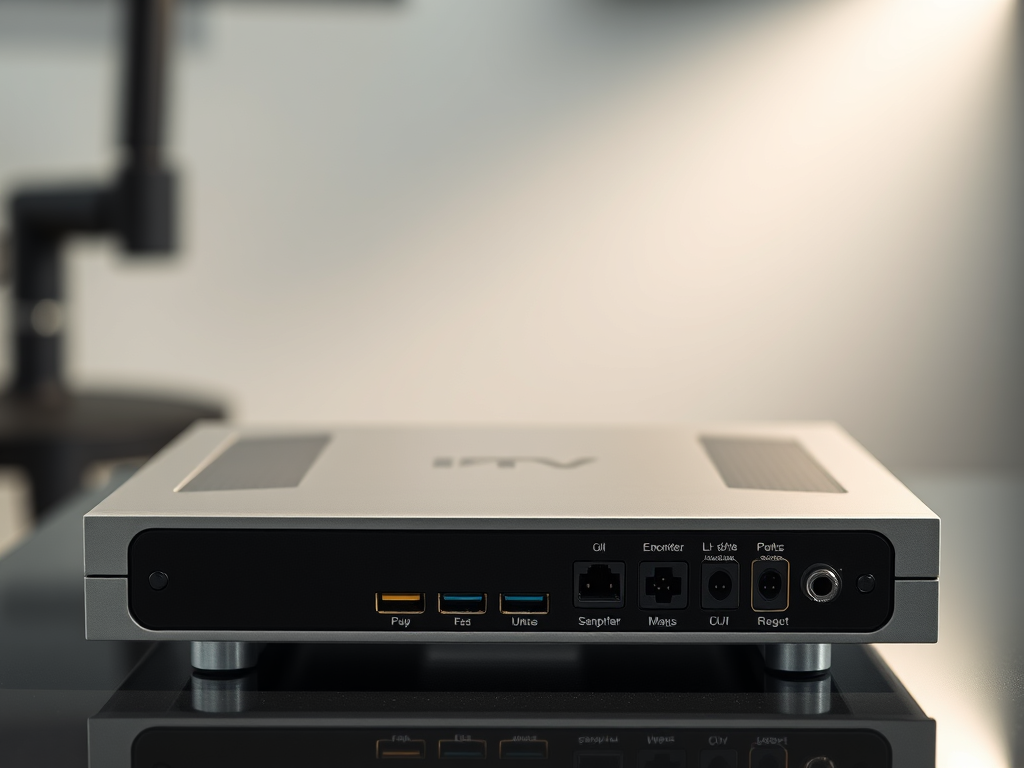
Understanding the Role of an Encoder for IPTV
In the world of IPTV (Internet Protocol Television), the encoder plays a crucial role in delivering high-quality streaming content to viewers. Without the encoder, it would be impossible to convert and broadcast traditional video content over the internet. If you’re involved in the setup or maintenance of an IPTV service, understanding what an encoder does and how it works is essential for ensuring a seamless streaming experience.
What is an IPTV Encoder?

An IPTV encoder is a device or software that converts video and audio signals into digital format for streaming over the internet. The encoder takes raw media content, such as a live broadcast or pre-recorded video, and compresses it into a streamable format, usually in H.264 or HEVC (H.265) codecs. This compressed digital signal can then be transmitted over the internet, allowing viewers to access the content on various devices, such as smart TVs, smartphones, and computers.
Key Functions of an IPTV Encoder
- Video and Audio Compression:
The primary role of an encoder is to compress the video and audio signals into a manageable size without compromising too much on quality. Video codecs like H.264 or H.265 are widely used in IPTV encoders because of their ability to balance high-quality video with lower bandwidth requirements. - Streaming Protocols:
Encoders also convert the compressed video and audio into a format that’s compatible with various streaming protocols. Popular protocols include RTMP (Real-Time Messaging Protocol), HLS (HTTP Live Streaming), and DASH (Dynamic Adaptive Streaming over HTTP). These protocols determine how the video is transmitted to the viewer’s device. - Real-Time Broadcasting:
IPTV often involves live broadcasting, such as sports events, news, or entertainment shows. Encoders allow for real-time encoding, meaning the content can be broadcasted live to users without significant delay. - Multi-Device Compatibility:
Modern encoders support multiple output formats, ensuring the video is compatible with various devices. Whether a user is watching on a smartphone, tablet, or smart TV, the encoder ensures the content looks good and is properly optimized for the device’s screen size and resolution. - Scalability:
High-quality IPTV services require the ability to scale based on demand. Encoders allow for adaptive bitrate streaming, which means they can adjust the video quality based on the viewer’s internet connection, ensuring smooth playback.
Types of IPTV Encoders
- Hardware Encoders:
These are physical devices specifically designed for video encoding. They offer high performance and are typically used by large-scale IPTV operators. Hardware encoders can handle high volumes of video streams simultaneously and are ideal for broadcasters, IPTV service providers, and large organizations. - Software Encoders:
Software encoders are installed on a computer or server and perform the same function as hardware encoders. They are usually more affordable but may not handle as much streaming load as their hardware counterparts. Popular software encoders include OBS Studio (Open Broadcaster Software), Wirecast, and vMix. - Cloud-Based Encoders:
These encoders operate on remote servers in the cloud. They offer a flexible, cost-effective solution for IPTV streaming, as they do not require expensive hardware. Cloud-based encoding services are popular with smaller IPTV providers or those who want to minimize on-premise equipment.
Choosing the Right Encoder for IPTV
Selecting the right encoder for your IPTV service depends on several factors:
- Content Type: Will you be streaming live events, movies, or on-demand content? Live content often requires higher-quality real-time encoding.
- Budget: Hardware encoders tend to be more expensive but offer superior performance, while software and cloud-based encoders are more affordable but may lack scalability.
- Viewer Experience: To ensure a smooth and enjoyable experience for your viewers, choose an encoder that supports adaptive bitrate streaming and ensures compatibility with multiple devices and platforms.
Benefits of IPTV Encoders
- High-Quality Streaming: Encoders allow for high-definition video quality that provides a better viewing experience for users, even with limited bandwidth.
- Cost-Effective: Especially with software and cloud-based encoders, IPTV services can be set up and maintained at a lower cost compared to traditional satellite or cable TV.
- Global Reach: IPTV services powered by encoders can be delivered to any part of the world with an internet connection, making them more accessible than traditional broadcasting methods.
- Scalability: As demand grows, IPTV service providers can scale their encoder resources to meet the increasing needs of viewers.
Conclusion
An IPTV encoder is a vital component in providing high-quality internet-based television services. Whether you are a content creator, broadcaster, or IPTV service provider, choosing the right encoder ensures that your audience receives a seamless, high-quality streaming experience. As the IPTV industry grows, encoders will continue to evolve, offering improved compression, real-time encoding, and support for a wider range of devices and streaming platforms.
By selecting the proper encoder and understanding its role in the streaming process, you can ensure your IPTV service delivers the best possible experience to your viewers.
I hope this article helps you understand the importance of IPTV encoders! Let me know if you’d like more details or have any questions.
You said:
h2 AND H1 AND H3
Video AI by invideo said:
Certainly! Below is the article you requested with the appropriate H1, H2, and H3 headers to help with structure and readability.
Understanding the Role of an Encoder for IPTV
In the world of IPTV (Internet Protocol Television), the encoder plays a crucial role in delivering high-quality streaming content to viewers. Without the encoder, it would be impossible to convert and broadcast traditional video content over the internet. If you’re involved in the setup or maintenance of an IPTV service, understanding what an encoder does and how it works is essential for ensuring a seamless streaming experience.
What is an IPTV Encoder?
An IPTV encoder is a device or software that converts video and audio signals into digital format for streaming over the internet. The encoder takes raw media content, such as a live broadcast or pre-recorded video, and compresses it into a streamable format, usually in H.264 or HEVC (H.265) codecs. This compressed digital signal can then be transmitted over the internet, allowing viewers to access the content on various devices, such as smart TVs, smartphones, and computers.
Key Functions of an IPTV Encoder
- Video and Audio Compression:
The primary role of an encoder is to compress the video and audio signals into a manageable size without compromising too much on quality. Video codecs like H.264 or H.265 are widely used in IPTV encoders because of their ability to balance high-quality video with lower bandwidth requirements. - Streaming Protocols:
Encoders also convert the compressed video and audio into a format that’s compatible with various streaming protocols. Popular protocols include RTMP (Real-Time Messaging Protocol), HLS (HTTP Live Streaming), and DASH (Dynamic Adaptive Streaming over HTTP). These protocols determine how the video is transmitted to the viewer’s device. - Real-Time Broadcasting:
IPTV often involves live broadcasting, such as sports events, news, or entertainment shows. Encoders allow for real-time encoding, meaning the content can be broadcasted live to users without significant delay. - Multi-Device Compatibility:
Modern encoders support multiple output formats, ensuring the video is compatible with various devices. Whether a user is watching on a smartphone, tablet, or smart TV, the encoder ensures the content looks good and is properly optimized for the device’s screen size and resolution. - Scalability:
High-quality IPTV services require the ability to scale based on demand. Encoders allow for adaptive bitrate streaming, which means they can adjust the video quality based on the viewer’s internet connection, ensuring smooth playback.
Types of IPTV Encoders
- Hardware Encoders:
These are physical devices specifically designed for video encoding. They offer high performance and are typically used by large-scale IPTV operators. Hardware encoders can handle high volumes of video streams simultaneously and are ideal for broadcasters, IPTV service providers, and large organizations. - Software Encoders:
Software encoders are installed on a computer or server and perform the same function as hardware encoders. They are usually more affordable but may not handle as much streaming load as their hardware counterparts. Popular software encoders include OBS Studio (Open Broadcaster Software), Wirecast, and vMix. - Cloud-Based Encoders:
These encoders operate on remote servers in the cloud. They offer a flexible, cost-effective solution for IPTV streaming, as they do not require expensive hardware. Cloud-based encoding services are popular with smaller IPTV providers or those who want to minimize on-premise equipment.
Choosing the Right Encoder for IPTV
Selecting the right encoder for your IPTV service depends on several factors:
- Content Type: Will you be streaming live events, movies, or on-demand content? Live content often requires higher-quality real-time encoding.
- Budget: Hardware encoders tend to be more expensive but offer superior performance, while software and cloud-based encoders are more affordable but may lack scalability.
- Viewer Experience: To ensure a smooth and enjoyable experience for your viewers, choose an encoder that supports adaptive bitrate streaming and ensures compatibility with multiple devices and platforms.
Benefits of IPTV Encoders
- High-Quality Streaming: Encoders allow for high-definition video quality that provides a better viewing experience for users, even with limited bandwidth.
- Cost-Effective: Especially with software and cloud-based encoders, IPTV services can be set up and maintained at a lower cost compared to traditional satellite or cable TV.
- Global Reach: IPTV services powered by encoders can be delivered to any part of the world with an internet connection, making them more accessible than traditional broadcasting methods.
- Scalability: As demand grows, IPTV service providers can scale their encoder resources to meet the increasing needs of viewers.
Conclusion
An IPTV encoder is a vital component in providing high-quality internet-based television services. Whether you are a content creator, broadcaster, or IPTV service provider, choosing the right encoder ensures that your audience receives a seamless, high-quality streaming experience. As the IPTV industry grows, encoders will continue to evolve, offering improved compression, real-time encoding, and support for a wider range of devices and streaming platforms.
By selecting the proper encoder and understanding its role in the streaming process, you can ensure your IPTV service delivers the best possible experience to your viewers.

